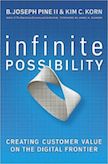
B. Joseph Pine
Author & Strategic Horizons Cofounder
Speaker's Fee Range : $20,000 - $30,000 Travels From : MN
Topics
Customer Service Marketing Best-Selling Author
Books

Infinite Possibility:
Creating Customer Value on the Digital Frontier
Joseph Pine and Jim Gilmore's classic The Experience Economy identified a seismic shift in the business world: to set yourself apart from your competition, you need to ...

The Experience Economy:
Work Is Theater & Every Business a Stage
Future economic growth lies in the value of experiences and transformations--good and services are no longer enough. We are on the threshold, say authors Pine and Gilmore, of "The Experi...
B. Joseph Pine Profile
B. JOSEPH PINE II is an internationally acclaimed author, speaker, and management advisor to Fortune 500 companies and entrepreneurial start-ups alike. He is cofounder of Strategic Horizons LLP, a thinking studio dedicated to helping businesses conceive and design new ways of adding value to their economic offerings.
In 2020 Mr. Pine and his partner James H. Gilmore re-released in hardcover The Experience Economy: Competing for Customer Time, Attention, and Money featuring an all-new Preview to their best-selling 1999 book The Experience Economy: Work Is Theatre & Every Business a Stage. The book demonstrates how goods and services are no longer enough; what companies must offer today are experiences – memorable events that engage each customer in an inherently personal way. It further shows that in today's Experience Economy companies now compete against the world for the time, attention, and money of individual customers. The Experience Economy has been published in fifteen languages and was named one of the 100 best business books of all time by 800ceoread (now Porchlight). His latest article in the Harvard Business Review is "The ‘New You' Business" (January-February 2022), coauthored with Lance Bettencourt, Jim Gilmore, and Dave Norton.
In 2020 Mr. Pine and his partner James H. Gilmore re-released in hardcover The Experience Economy: Competing for Customer Time, Attention, and Money featuring an all-new Preview to their best-selling 1999 book The Experience Economy: Work Is Theatre & Every Business a Stage. The book demonstrates how goods and services are no longer enough; what companies must offer today are experiences – memorable events that engage each customer in an inherently personal way. It further shows that in today's Experience Economy companies now compete against the world for the time, attention, and money of individual customers. The Experience Economy has been published in fifteen languages and was named one of the 100 best business books of all time by 800ceoread (now Porchlight). His latest article in the Harvard Business Review is "The ‘New You' Business" (January-February 2022), coauthored with Lance Bettencourt, Jim Gilmore, and Dave Norton.
In 2011 Mr. Pine also co-wrote with Mr. Kim C. Korn Infinite Possibility: Creating Customer Value on the Digital Frontier, on how to use digital technology to stage experiences that fuse the real and the virtual. At its core is a new framework called the Multiverse that builds on the fundamental nature of the created universe – time, space, and matter – by showing how digital technology flips each of these dimensions on their head to create new worlds, first in our imagination and then in our experience.
In 2007 Mr. Pine wrote Authenticity: What Consumers Really Want with Mr. Gilmore, which recognizes that in a world of increasingly paid-for experiences, people no longer accept the fake from the phony, but want the real from the genuine. Amazon.com named it one of the top ten business books of 2007 while a cover story in TIME magazine cited it as one of "10 ideas that are changing the world".
His first book was the award-winning Mass Customization: The New Frontier in Business Competition, which details the shift companies are making from mass producing standardized offerings to mass customizing goods and services that efficiently fulfill the wants and needs of individual customers. The Financial Times chose it as one the seven best business books of 1993.
Mr. Pine consults with a numerous companies around the world, helping them embrace the ideas and frameworks he writes about, develop concepts for creating more economic value, and see those concepts become reality. In his speaking and teaching activities, Mr. Pine has addressed both the World Economic Forum and TED and has been a Visiting Scholar with the MIT Design Lab and a Visiting Professor at the University of Amsterdam. He has also taught at Penn State, Duke Corporate Education, the University of Minnesota, and UCLA's Anderson Graduate School of Management. He serves on the editorial boards of Strategy & Leadership and Strategic Direction, and is a Senior Fellow with both the Design Futures Council and the European Centre for the Experience Economy, which he co-founded.
Prior to cofounding Strategic Horizons Mr. Pine held a number of technical and managerial positions with IBM. He is a prolific writer, including articles for the Harvard Business Review, The Wall Street Journal, Chief Executive, Worldlink, CIO, Strategy & Leadership, and the IBM Systems Journal, among many others. He is frequently quoted in such places as Forbes, The New York Times, Wired, USA TODAY, Investor's Business Daily, ABC News, Good Morning America, Fortune, Bloomberg BusinessWeek, and Industry Week.

B. Joseph Pine Talk Titles
Topics
Customer Service Marketing Best-Selling Author
Books

Infinite Possibility:
Creating Customer Value on the Digital Frontier Joseph Pine and Jim Gilmore's classic The Experience Economy identified a seismic shift in the business world: to set yourself apart from your competition, you need to stage experiences -- memo...

The Experience Economy:
Work Is Theater & Every Business a Stage Future economic growth lies in the value of experiences and transformations--good and services are no longer enough. We are on the threshold, say authors Pine and Gilmore, of "The Experience Economy", a n...